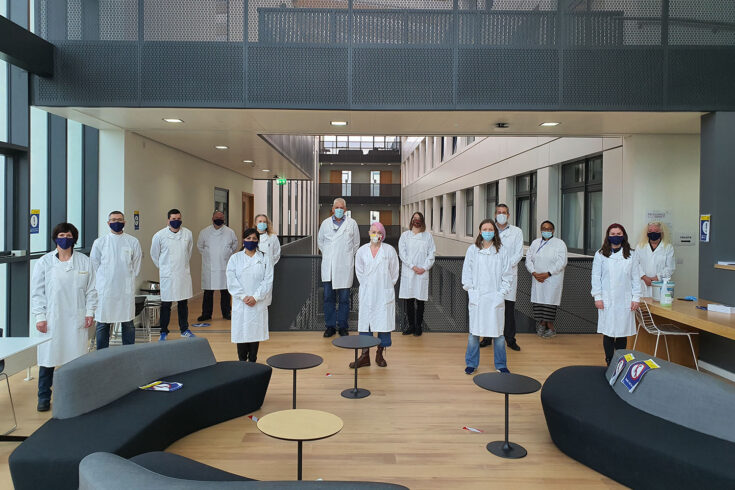I have a confession to air. I spent my first decade as a scientist believing the pharmaceutical industry was evil! Much like the Orwellian conditioning of four legs good, two legs bad, I had been taught to mistrust the big pharma companies.
I am now of very different mind. I am the General Manager and Deputy Head of the Medical Research Council’s (MRC) Protein Phosphorylation and Ubiquitylation Unit (PPU) at the University of Dundee.
My unit has built a reputation for working with industry, and I am blogging this (whatever that means!) to share with you the real benefits of doing so.
The Cohen effect
The story starts in a shabby conference room near Heathrow Airport in the late 1990s. Professor Sir Philip Cohen, the founder of my unit, has locked the legal teams of six of the biggest pharma companies in a room. He will not let them out until they have agreed terms for collaboration.
We are the most northerly MRC unit and the furthest away from what is often called the ‘Golden Triangle’ of London, Oxford and Cambridge. Sir Philip had persuaded the world’s major pharma companies that kinases, enzymes that catalyse the transfer of phosphate groups, were the next big drug target and Dundee was where to study them.
The lawyers came to an agreement, were released from the stuffy room. And 25 years on, The Division of Signal Transduction Therapy (DSTT) is now widely acknowledged as the model for academic and industry partnership.
Benefits of partnering with industry
As I alluded to, I was not always convinced of the benefits of partnering with industry. So, what changed my mind? Evidence! I am a scientist and therefore can be persuaded by hard facts.
I arrived in Dundee in 2009 and the first thing that struck me was the real impact of the work here. Yes, there was money. However, it was not the funding that really influenced me. It was the real impact of the research from PPU. It was the evidence that working with an industry partner can mean we can directly translate our results to the clinic.
Tangible impact of pharma collaboration
The DSTT collaboration has led to the development and clinical approval of over 40 drugs that target kinases. This has been mainly for the treatment of cancer, with sales of many billions of pounds a year.
For example, researchers within the DSTT played a significant role in aiding GlaxoSmithKline to develop a new anti-cancer drug, Dabrafenib (Tafinlar), targeting melanoma.
I suspect at this point, many readers will be thinking ‘but at what cost’? That working with pharma means never publishing or speaking at conferences again!
Absolutely not. The DSTT for example has been recognised as one of the earliest examples of ‘open innovation’ where risks and outputs are shared.
My own research group works almost uniquely on pharma-partnered projects. Of course, there needs to be understanding on what can be published and when. However, the pharma scientists want to publish as much as we academics do.
Academic rewards of partnership
Hopefully you are beginning to see why I rapidly changed my views on pharma partnerships with academia? There is one remaining point I would like to make before I sign off though.
The PPU’s Director, Professor Dario Alessi, was recently awarded The Louis-Jeantet Prize for Translational Medicine. This is one of the most prestigious awards an academic can receive. And rightly so, Dario’s work has led to drugs in late-stage clinical trials with real promise to help the patients.
I’ve known Dario for a long time and admire him greatly. I am in awe of his brilliant fundamental research into the causes of Parkinson’s Disease. What I most admire though, and why I now believe so passionately in pharma collaboration, is his willingness to work with industry in an open and transparent way. It was this that led to the true impact of his work being realised.
Dario said:
For biomedical researchers, working with companies is a no brainer in my opinion. It provides us with access to state-of-the-art chemical probes, technologies and other reagents. It provides significant research funding. It offers a valuable training experience for our PhD and Postdoc researchers.
Most importantly, it opens up exciting opportunities to exploit our research and make impact as well as guidance on what are the most important questions of the day that we should concentrate on.
More information
Inspired by the DSTT collaboration, the MRC PPU also provides reagents and services to researchers around the world in the fields of protein phosphorylation and ubiquitylation. In addition, the MRC PPU provides a DNA sequencing service.
If you are interested in collaborating with industry, all of the MRC’s grant schemes support such submissions using the MRC Industry Collaboration Framework.




